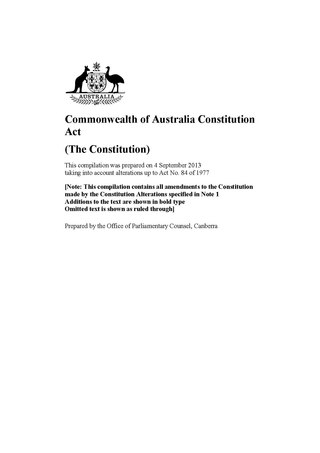Related Research Articles
LexisNexis Risk Solutions is a global data and analytics company that provides data and technology services, analytics, predictive insights, and fraud prevention for a wide range of industries. It is headquartered in Alpharetta, Georgia, and has offices throughout the U.S. and in Australia, Brazil, China, France, Hong Kong SAR, India, Ireland, Israel, the Philippines, and the United Kingdom.

Australian Securities Exchange Ltd (ASX) is an Australian public company that operates Australia's primary securities exchange, the Australian Securities Exchange. The ASX was formed on 1 April 1987, through incorporation under legislation of the Australian Parliament as an amalgamation of the six state securities exchanges, and merged with the Sydney Futures Exchange in 2006.

National Australia Bank is one of the four largest financial institutions in Australia in terms of market capitalisation, earnings and customers. NAB was ranked the world's 21st-largest bank measured by market capitalisation and 52nd-largest bank in the world as measured by total assets in 2019.

The Commonwealth Bank of Australia (CBA), also known as Commonwealth Bank or simply CommBank, is an Australian multinational bank with businesses across New Zealand, Asia, the United States, and the United Kingdom. It provides a variety of financial services, including retail, business and institutional banking, funds management, superannuation, insurance, investment, and broking services. The Commonwealth Bank is the largest Australian listed company on the Australian Securities Exchange as of July 2024, with brands including Bankwest, Colonial First State Investments, ASB Bank, Commonwealth Securities (CommSec) and Commonwealth Insurance (CommInsure). Its former constituent parts were the Commonwealth Trading Bank of Australia, the Commonwealth Savings Bank of Australia, and the Commonwealth Development Bank.
LexisNexis is an American data analytics company headquartered in New York, New York. Its products are various databases that are accessed through online portals, including portals for computer-assisted legal research (CALR), newspaper search, and consumer information. During the 1970s, LexisNexis began to make legal and journalistic documents more accessible electronically. As of 2006, the company had the world's largest electronic database for legal and public-records–related information. The company is a subsidiary of RELX.
The Australian Securities and Investments Commission (ASIC) is an independent commission of the Australian Government tasked as the national corporate regulator. ASIC's role is to regulate company and financial services and enforce laws to protect Australian consumers, investors and creditors. ASIC was established on 1 July 1998 following recommendations from the Wallis Inquiry. ASIC's authority and scope are determined by the Australian Securities and Investments Commission Act 2001.
John Dyson Heydon is an Australian former judge and barrister who served on the High Court of Australia from 2003 to 2013 and the New South Wales Court of Appeal from 2000 to 2003, and previously served as Dean of the Sydney Law School. He retired from the bench at the constitutionally-mandated age of 70 and went on to chair the Royal Commission into Trade Union Governance and Corruption between 2014 and 2015, an appointment that was politically controversial due to his avowed conservatism and connections with the governing conservative party.

New South Wales v The Commonwealth, the Incorporation Case, was a decision handed down in the High Court of Australia on 8 February 1990 concerning the corporations power in s51(xx) of the Commonwealth Constitution. The states of New South Wales, South Australia and Western Australia brought an application seeking a declaration as to the validity of certain aspects of the Corporations Act 1989 (Cth).
Australian insurance law is based on commercial contract law, but is subject to regulations that affect the insurance industry and insurance contracts within Australia. Commonwealth Parliament has power to make laws with respect to insurance and insurance companies under section 51(xiv) and (xx) of the Australian Constitution. Generally, the Insurance Act 1973 and Insurance Contracts Act 1984 are the main acts that apply, however there are a number of other pieces of legislation enacted by the states, private codes and voluminous case law all of which forms the body of insurance law.

Colonial First State (CFS), is an Australian wealth management group that provides investment, superannuation and retirement products to individuals and corporate and superannuation fund investors.
Professor Ian Ramsay is Redmond Barry Distinguished Professor Emeritus, Melbourne Law School and a former director of their Centre for Corporate Law and Securities Regulation in Melbourne, Australia. He is an academic lawyer, author, and prominent media commentator on corporate law and securities law issues in Australia.
Anthony Michael "Tony" D'Aloisio AM was Chairman of the Australian Securities and Investments Commission (ASIC). He held the position from 13 May 2007 to 2011, having previously served as an ASIC commissioner.

Macquarie Group Limited, known more commonly as Macquarie Bank, is a global investment banking and financial services group providing banking, financial advisory and investment, and funds management services, to institutional, corporate, and retail clients and counterparties, around the world, headquartered in Sydney and listed in Australia. Macquarie Bank employs more than 20,000 staff across four operating groups in 34 markets and its Investment Banking division is Australia's top ranked mergers and acquisitions adviser with more than A$871 billion in assets under management and is the world's largest infrastructure asset manager.

Australian corporations law has historically borrowed heavily from UK company law. Its legal structure now consists of a single, national statute, the Corporations Act 2001. The statute is administered by a single national regulatory authority, the Australian Securities & Investments Commission (ASIC).

Westpac Banking Corporation, known simply as Westpac, is an Australian multinational banking and financial services company headquartered at Westpac Place in Sydney.

Australian Financial Services Licence (AFSL) is a legal licence provided by the Australian Securities and Investments Commission (ASIC) enabling the operation and activities of Australian financial services businesses. It is a legal requirement for any Australian financial service business to obtain an AFSL from the day business operations begin unless provided a limited licence or exemption with special provisions under section 911A(2)(l) of the Corporations Act. The AFSL is issued by ASIC under Chapter 7 of the Corporations Act 2001, in line with its regulatory supervision of the financial services industry. Australian Financial Service Businesses must submit an application to ASIC coupled with supporting documents to be assessed. Licensees are obligated to provide efficient, honest and fair financial services under the conditions of their AFSL and the Corporations Act 2001. Failure to follow and uphold the policies under the AFSL and the Corporations Act 2001 will result in penalties against the business.

Storm Financial Limited was a financial advice company, based in Townsville, Queensland, Australia. The company was founded by Emmanuel Cassimatis and his wife Julie Cassimatis as a private company initially with the name Cassimatis Securities Pty Ltd on 23 May 1994. As part of the company's expansion outside of Townsville the company changed its name from a personality based name to ozdaq Securities Pty Ltd on 10 April 2000. This name remained intact until 1 February 2004 when it was relinquished consequent to trademark objections from the Nasdaq stock exchange in the United States. The company then traded as Storm Financial Pty Ltd from 2 February 2004 until 14 June 2007 at which time the company became an unlisted public company and continued trading as Storm Financial Ltd from 15 June 2007 in preparation for making an initial public offering (IPO) in December 2007. This IPO was subject to a Storm Financial Prospectus which was dated 14 November 2007 and lodged with the Australian Securities & Investments Commission (ASIC) on the same date. Storm Financial Ltd continued to trade until external administrator Worrells Solvency and Forensic Accountants were appointed on 9 January 2009. The main creditor Commonwealth Bank appointed receivers and manager KordaMentha on 15 January 2009.

Bloomberg Law is a subscription-based service that uses data analytics and artificial intelligence for online legal research. The service, which Bloomberg L.P. introduced in 2009, provides legal content, proprietary company information and news information to attorneys, law students, and other legal professionals. More specifically, this commercial legal and business technology platform integrates Bloomberg Law News with Bloomberg Industry Group's primary and secondary legal content and business development tools.

La Trobe Financial is an Australian credit asset management firm specialising in asset management and credit. It offers real estate credit, investment account offerings and private wealth management. The CEO is Mr. Chris Andrews. La Trobe Financial's head office is located in Melbourne, with corporate offices in Sydney, Shanghai and Hong Kong.

Paul Joseph Hugh McDermott is an Australian politician who was elected to the New South Wales Legislative Assembly as the State Member for Prospect for the Labor Party at the 2015 New South Wales state election. Prior to entering Parliament he had a career as an international lawyer and university academic. Since 2023 he has served as Parliamentary Secretary to the Attorney General in the government of Chris Minns.
References
- 1 2 3 4 "Emeritus Professor Pamela Hanrahan". University of New South Wales. 19 June 2024.
- 1 2 Pelly, Michael (18 May 2023). "ASIC expert back on the tools with top law firm". Australian Financial Review. Retrieved 19 June 2024.
- 1 2 "Who's Who in Business in Australia". 2022.
- ↑ "Professor Pamela Hanrahan". Johnson Winter Slattery. Retrieved 9 August 2024.
- ↑ "Managed Investments Law" (PDF). University of Tasmania Law Review. 18 (1): 172–173. 1999.
- ↑ "Dr Pamela Hanrahan appointed Regional Commissioner for Queensland". Australian Securities and Investments Commission. 29 July 2010. Retrieved 9 August 2024.
- ↑ "ASIC Annual Report 2010-11" (PDF). Australian Securities and Investments Commission. Retrieved 9 August 2024.
- ↑ "Professor Pamela Hanrahan". University of Melbourne. Retrieved 9 August 2024.
- ↑ "ASIC Enforcement Review Taskforce Report". treasury.gov.au. Australian Government Department of Treasury. 2017. Retrieved 9 August 2024.
- ↑ Vickovich, Aleks (3 March 2020). "Hayne adviser blasts Frydenberg's FAR proposal". Australian Financial Review. Retrieved 9 August 2024.
- ↑ "New BLS Executive". Law Council of Australia. 6 June 2024. Retrieved 19 June 2024.
- ↑ "Professor Pamela Hanrahan" (PDF). Law Society of New South Wales. Retrieved 9 August 2024.
- ↑ "Prominent corporate lawyer and academic, Professor Pamela Hanrahan, joins Johnson Winter Slattery". Johnson Winter Slattery. May 2023. Retrieved 9 August 2024.